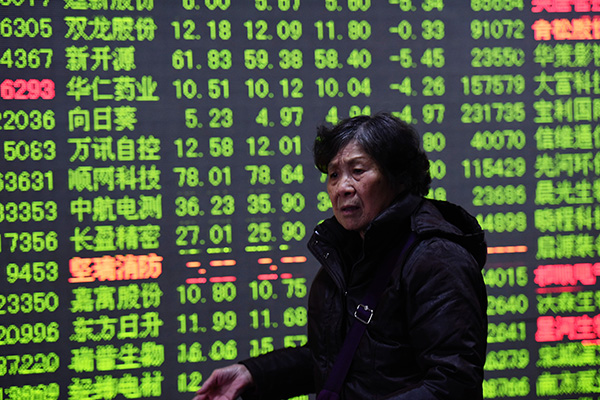China's stock market seen as maturing, institutionalizing
By Cecily Liu (China Daily Europe) Updated: 2016-01-15 18:38
 |
|
An investor walks past an electronic display showing prices of shares at a brokerage house in Hangzhou, East China's Zhejiang province, Jan 15, 2016. [Photo/Asianewsphoto by Long Wei] |
China's stock market is maturing and institutionalizing rapidly and a big milestone is expected with the intended launch of new IPOs by registration system, providing confidence that it will offer a trusted and attractive platform for foreign investors keen to buy into the China growth story, experts say.
They were speaking in January ahead of the World Economic Forum in Davos, time when volatility in Chinese stock market is attracting a great deal of global attention, particularly as the sharp falls of the Chinese blue-chip index in the New Year opening triggered drops in global commodity and asset market prices.
But experts remain firm in the belief that the Chinese stock market is rapidly becoming institutionalized, and with that the government will increasingly play the role of the rule enforcer rather than directly influencing stock prices.
The game-changer is the proposed reform of China's stock market from the approval-based IPO system to a registration system, which will likely take place later this year, although exact timeline has not yet been announced.
The new system allows nominated advisors to float a company for which they see market demand, and this system is expected to speed up the IPO pipeline. Under the current system, new IPOs are subject to approval from the China Securities Regulatory Commission, which controls both the timing and pricing of the IPOs, but limited staffing resources at CSRC means there is a queue of companies waiting to sell shares.
"The new registration system would change the market landscape for retail and institutional investors," says Norman Li, a Hong Kong-based partner at the law firm Allan and Ovary.
"The regulators would play a more neutral role in the IPO process, by putting the focus into setting the rules rather than endorsing an IPO. They would set the rules such as information disclosure, listing criteria, rules for investor protection," Li says.
This would allow investors to focus more in the value of the investment, rather than making an investment of an IPO because it is endorsed by the regulator. Because not every retail investor would have the ability to do such in-depth analysis of the companies' financial details, some retail investors would ask professional asset managers to manage their investments rather than trading directly in the stock market, Li says.
Li's comments are echoed by Fang Jian, Managing Partner of Linklaters China, who further explains that the current approval system contributes to the typical mindset of investors, particularly retail investors, that the market always has the backing of the government.
"This is why retail investors generally turn blind on the fundamentals of each individual company in their trading of stocks on the exchanges in China," says Fang.
"With the registration based system being in place, and the corresponding removal of a de facto quota on the number of listings for certain periods, I would also expect a significant increase of the number of listings in the coming future. This would also make it more difficult for retail investors to rely on themselves for making proper investment decisions," he says.
China's stock market is relatively young. Founded in 1990, it is still mainly dominated by retail investors, both because the country's culture of institutional investment is just beginning and the pool of asset management talents is still small.
As a result, the government at times has had to intervene over stock market prices through policies, to protect the interests of retail investors. One example is the government led strategic purchase of shares in late 2015 to reduce the impact of China's stock market crisis. Goldman Sachs estimates the Chinese government has used 1.5 trillion yuan in July and August 2015 to support the stock market.
But such heavy intervention by the Chinese government is no solution for the long term, and the 2015 stock market crisis led to significant changes in mentality, both due to the scale of the price slumps and also the increasing difficulty for the Chinese government to control stock market prices through policy tools.
During the 2015 stock market crisis, which started in late June, the Shanghai stock market had fallen 30 percent over three weeks as 1,400 companies, or more than half listed, filed for a trading halt in an attempt to prevent further losses.
A collection of government intervention measures in the following months stabilized stock market prices, but in early January the Chinese market again attracted international attention after trading was halted on January 4 and 7.
Again the impact on global markets has been clearly felt, with the oil price falling to a fresh 11-year low of under $33 a barrel for Brent crude. Major stock market indexes in Japan and New York also fell over the same period, partly because investors interpreted the Chinese stock market drops as indications of a weakening Chinese economy.
"Fluctuations in China's stock markets have already been affecting overseas stock markets. The first few days of trading in 2016 are a good example of the influence of Chinese markets on other major markets. We see no reason for discontinuation of this trend," says Tim Bednall, a corporate partner at King & Wood Mallesons, a law firm in London.
Despite internal challenges faced by the Chinese stock market, overseas investors are still keen to access the market, believing it cannot be ignored at a time when so few good investment opportunities exist globally.
"Given its trading volume and size, institutional investors with mandates that permit investment in Chinese listed stocks are increasingly likely to include Chinese stocks when doing global asset allocations," says Bednall.
Li says the reasons for more global asset allocation into China's stock market are many, and within this context the internationalization of the renminbi plays a significant role, because companies and financial institutions that hold offshore renminbi as a consequence of the currency's increasingly global circulation may prefer to invest in the Chinese stock market.
These investors include trading companies that accept renminbi from their Chinese buyers, or institutions like banks that clear renminbi transactions. In addition, there may be other funds that have set objectives to diversify and invest a portion of their funds in the Chinese market, or funds that need to hedge their positions, Li says.
In the long term, he Chinese stock market's impact on the global market is expected to grow further, both foreign investors' access to the Chinese stock market will increase over time as the Chinese financial market opens up, and also because this will lead to larger correlations between the Chinese and overseas stock exchanges.
Fang says the correlation between the Chinese stock market and overseas market has more of a psychological impact because there is only limited access to the Chinese market by foreign investors and the stock market does not fully reflect the real economy of China.
"With the reform of the capital market to be market-based, and its further opening up to the outside world, there is no doubt that there will be more correlation between Chinese and overseas stock exchanges," says Fang.
He says this growing correlation this is the story of globalization, whereby international markets become increasingly inter-dependent. "This presents more opportunities than risks, as it ultimately requires greater cooperation between governments to foster stability."
Li adds that he too expects to see a bigger contribution from a more mature Chinese stock market to global capital markets.
"In the longer term, it will be a good place for foreign investors to increasingly share the growth of the Chinese economy. Over time China's A-share market would also likely to be included in more global indexes such as the MSCI, which will help foreign investors to increasingly invest in the market, or use it as a bench mark of their investments," says Li.
To contact the reporter: cecily.liu@mail.chinadailyuk.com
- Stock market circuit breaker mechanism comes under flak
- China suspends stock market 'circuit breaker'
- Stock market rebounds after worst start to new year
- China's economic fundamentals still sound despite stock market fluctuation
- Try to keep your head in stock market, when all around are losing theirs
- Stock market remains a big draw despite the roller-coaster year
- 'China can keep RMB exchange rate stable'
- AIIB offers new channels for global finance
- Apple presents special edition watch to celebrate Chinese New Year
- China EximBank steps up Belt and Road support
- China's tourism robust in 2015, investment surges
- Tobacco sector contributes more to China's revenue
- Chinese banks lent more in 2015
- Officials deny China's graft fight has hindered economy

















